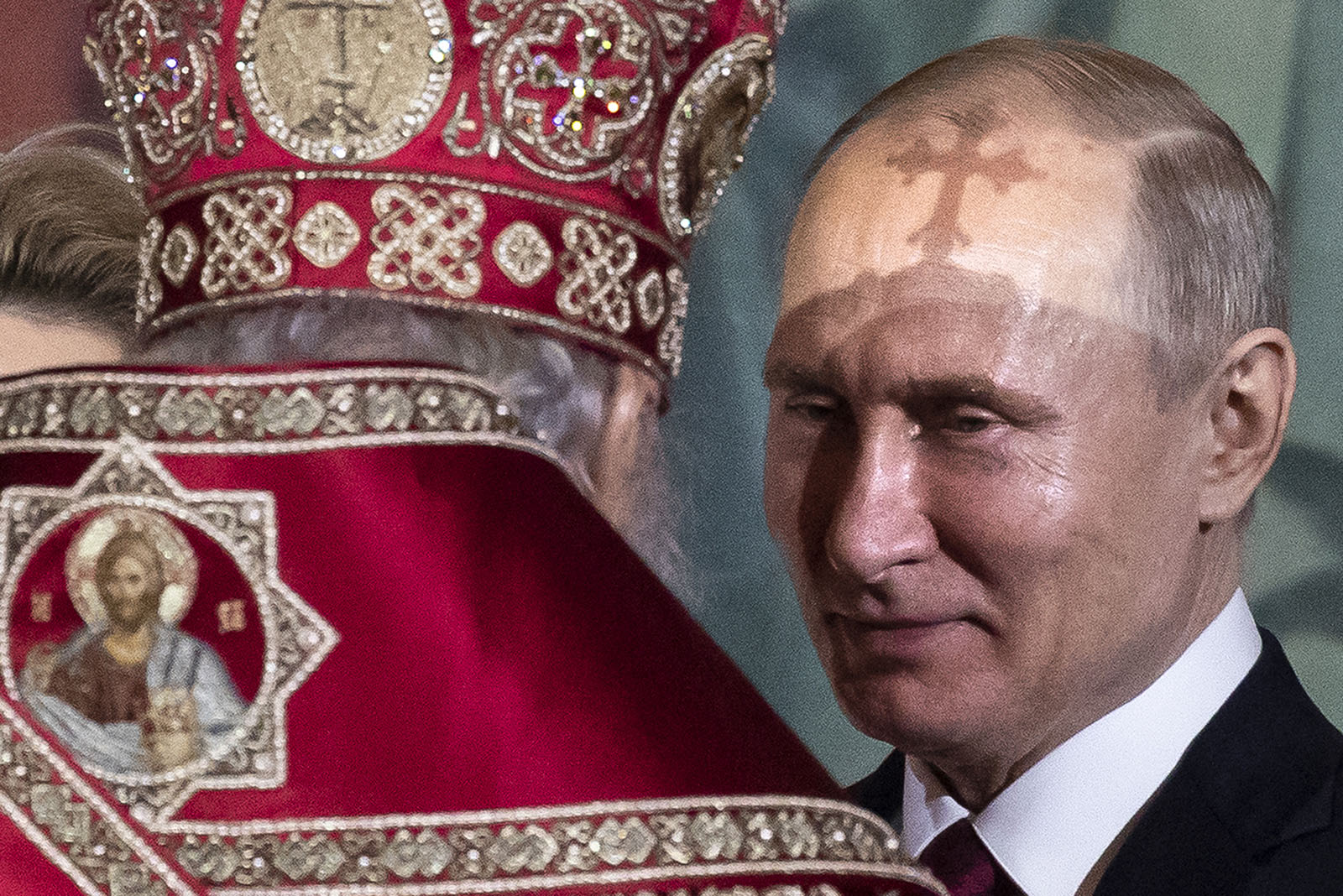by Jude Lobo

At a pro-war rally held in the center of Moscow on March 18th, 2022, passionate sentiments of pride on the anniversary of Russia’s reclamation of Crimea and support for the ongoing efforts of Russian soldiers fighting to “liberate” Ukraine were shared, broadcast across Russia by state sponsored networks. The crowning moment of the pro-war rally occurred during a speech given by Putin himself, who paraphrased the Bible in an effort to justify the invasion of Ukraine to over 200,000 Russians in attendance: “There is no greater love than if someone gives his soul for his friends” (John 15:13) (Quay 4). This curious mixture of religion and propaganda that has been taking a hold of Russian politics in the last two decades is explained in part by Maria Engstrom’s essay on “Contemporary Russian Messianism and New Russian Foreign Policy”, particularly through the concept of “Katechon” and its resulting effects on Russian foreign policy and security doctrine.
Engstrom brings to light the understanding of Russia as “Katechon”, a Christian Orthodox term popularized by 20th century right-wing intellectual circles to serve as the “unofficial” official ideology of post-Soviet Russia. “Russia as Katechon” portrays Russia to be the world’s ‘shield’ against the apocalyptic forces of chaos, with the Russian state itself existing to defend against the Antichrist and the resulting end of times (Engstrom 357). Engstrom points out that this neoconservative understanding of the inherent purpose of the Russian state is not an aberration paraded by a handful of fringe conservative groups. Rather, it is literally embedded into the policy goals of Russia itself. For example, Russian foreign policy and state security doctrine have regressed to an outlook of the world that is more at home with religio-medieval dogma than modern international relations theory. For example, all states beyond Moscow’s control are interpreted uniformly as in league with the “external antichrist” (i.e. the decadent “Great Sodom” that is the West), whilst those within Russia’s borders not in agreement with official state ideology are considered the “internal antichrist”, no less dangerous than its external counterpart (Engstrom 363). Thus, because the Russian state is always understood to be under attack within this framework. Seemingly contradictory statements such as the following, spoken by influential young conservative publicist Egor Kholmogorov, make perfect sense: “Russians always “defend”, even when it might seem that they attack” (Engstrom 365).
Thus, it is in such a way that one sees the doctrine of “Atomic Orthodoxy” take shape, Russia’s “double shield”, composed of Orthodoxy to secure Russia on the ideological front and the atomic military-industrial complex to secure Russia’s physical frontiers (Engstrom 368). An oxymoronic environment which produces phenomena such as Orthodox priests blessing atomic warheads, this “double shield” policy delivers one clear neoconservative message: If it means saving the world from the clutches of the Antichrist, Russians are more than ready to “remove the lid”, as it is understood to be their sacred duty (Engstrom 368). The Russians will stop at nothing to achieve their interests, because ‘they are the third empire, and there shall not be a fourth. After Russia is only the Apocalypse” (Engstrom 368).
In line with Engstrom’s 2014 analysis, one can see Russia’s “Double Shield” out in full force eight years later, with Putin pushing neoconservative Orthodox dogma on the home front whilst his army liberates Ukraine from “evil” abroad, all the while flexing Russia’s nuclear capabilities should the West ever think of interfering with Russia’s “holy” struggle (Quay, Guardian 1). Critically speaking, in an effort to extend Engstrom’s analysis, one cannot help but wonder what Russia’s approach means for the world order: Is the cultivation of a Messianic destiny, backed by nuclear weapons, all one needs to supersede the global order? As thousands of years of political history mired in religious dogma have shown, it is hard to debate against “god” or even an idea which claims to be backed by “god”; Thus, one cannot expect the Russian people to emancipate themselves from such a compelling line of propaganda, one no less backed by the threat of overwhelming military violence. The prospect of this unique “double shield” threat, in my view, warrants the development of a “double sword” doctrine to meet it, namely, one that seeks to delegitimize the Russian leadership at every level, exposing the fact that their support for Orthodoxy and Messianic destiny is a loose ploy to legitimize their own control over their state (First Sword), and further, one that dares to tread the Cold-War-era path of nuclear diplomacy, enforcing the idea that playing hard and fast with nuclear weapons does not lend one free reign over the established global order (Second Sword).
Russia’s actions warrant global action, as Putin’s eyes are not only in Ukraine, but are on the entire globe. Both his methods and his aims are global in nature: his call for fighters from around the world to join the Russian Army to expel “evil” from Ukraine are not unlike the calls put out by various Islamic terror groups, calling fighters to help in the establishment of a “Global Ummah”. The phenomenon of “Atomic Orthodoxy” in Russia is certainly unusual, but by no means is it historically unique. The West would do well to ensure that the threat of ending history (and the world) outright does not invite history to repeat itself, with religion once again being misused towards politically immoral ends.
Works Cited
Engström, Maria. “Contemporary Russian Messianism and New Russian Foreign Policy.” Contemporary Security Policy, vol. 35, no. 3, 2014, pp. 356–379., https://doi.org/10.1080/13523260.2014.965888. .
Guardian. (2022, February 28). Putin signals escalation as he puts Russia’s nuclear force on high alert. The Guardian. Retrieved March 21, 2022, from https://www.theguardian.com/world/2022/feb/27/vladimir-putin-puts-russia-nuclear-deterrence-forces-on-high-alert-ukraine
Quay, Grayson. “Putin Quotes Jesus to Justify Invasion of Ukraine.” Yahoo! News, Yahoo!, 2022, https://www.yahoo.com/news/putin-quotes-jesus-justify-invasion-155344994.html.
